[Big read] Anti-war campus protests in the US test Biden’s support for Israel
A wave of anti-war protests on US campuses has put the US government’s staunch support for its ally, Israel, in the spotlight. As a result, Americans of different generations are beginning to discuss and reflect on the intersection of Jewish influence and US foreign policy. Another significant implication is that President Biden’s re-election chances are at risk if some resolution is not achieved by the end of the summer school holidays in August.
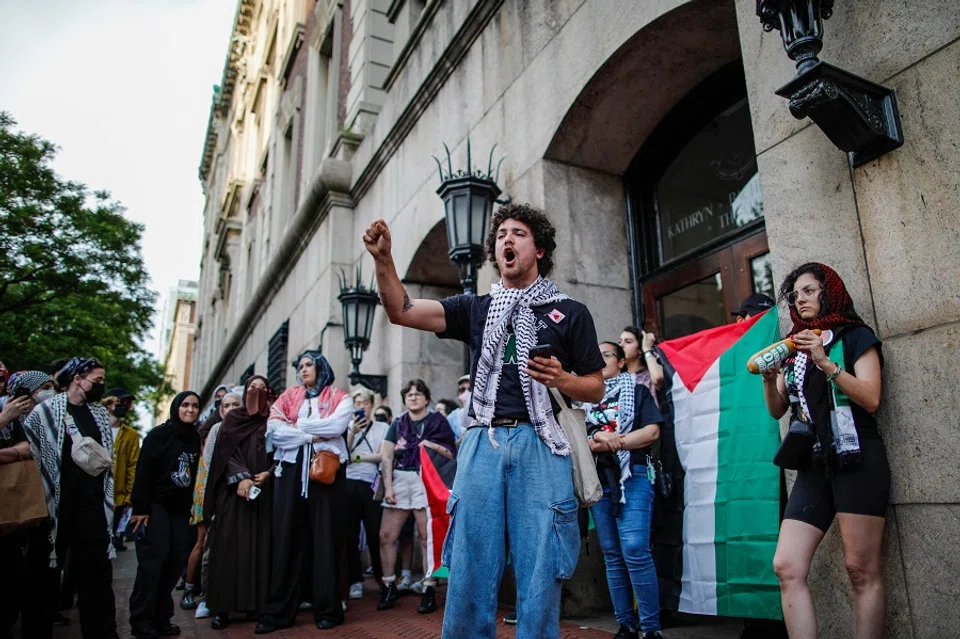
In the US, Americans are discussing whether the country belongs to them or to the Israelis. As Israeli military action in the Gaza Strip led to a severe humanitarian crisis, protests broke out on US campuses as Americans began to reflect and discuss the social impact of the US’s unstinting support for Israel.
Joyce Keokham, an American artist from New York, told Lianhe Zaobao that anyone who pays attention to the way American laws are made and US tax dollars are spent would realise that the US has firmly supported Israel since its inception. This is because “Israel serves as an American colony; it is a settler colonisation project propped up by the US on behalf of ‘American interests’”.
Keokham added, “These interests are not representative of everyday American people, they represent the small percentage of wealthy elites who see economic opportunities in land and natural resources, in weapons and war, in having a Middle Eastern presence.”
... current wave of anti-war protests is fuelling an “awakening” in the US as Americans of different generations, at least within its academic communities, begin to discuss and reflect on the Jewish influence on American society. — Professor Liu Yongtao, Centre for American Studies, Fudan University
A history of strong US-Israel relations
The special relationship between the US and Israel stems from the strategic choices made by the two sides. When Israel declared its independence back in 1948, the US was the first country to recognise it. Initially, the US only provided Israel with economic and material aid, but by the 1960s, Israel had become the foremost American ally in the Middle East. The US provided military, fiscal and political support to Israel; through its relations with Israel, the US enhanced its Middle Eastern presence and kept pace with its competitors in the region.
After the 7 October attack on Israel, the Israeli army exacted excessive punishment on the Hamas-controlled Gaza Strip in the name of rooting out Hamas elements and demanding for the release of hostages.

As a result, more than 35,000 civilians were killed, putting the Biden administration under immense pressure at home and abroad, and testing US-Israel ties.
On 18 April, anti-war protests broke out at Columbia University before spreading subsequently to 60 or so other colleges like Harvard University, Yale University, and the University of Pennsylvania. The spate of protests has thrust the special relationship between the US and Israel into the spotlight.
When interviewed by Lianhe Zaobao, Professor Liu Yongtao at Fudan University’s Centre for American Studies said that the current wave of anti-war protests is fuelling an “awakening” in the US as Americans of different generations, at least within its academic communities, begin to discuss and reflect on the Jewish influence on American society.
The truth is there is still plenty of firm support for Israel in the US as Jewish groups continue to wield huge influence there, so the school protests are unlikely to sway Washington’s policies towards Israel.
Evan Resnick, a senior associate fellow at the Nanyang Technological University (NTU) S. Rajaratnam School of International Studies, described the level of support for Palestine in the US as the highest it has been in decades. He told Lianhe Zaobao, “There are some places in the United States like in Michigan, where there’s a pretty substantial Arab-American population that has been more active in promoting the Palestinian cause, but until this war, it’s been a pretty lopsided balance in terms of public support for Israel versus the Palestinians. That’s changing.”
One-sided support for Israel no more
There is a clear generational divide among Americans in their support for Israel or Palestine. According to data released by the Pew Research Center on 2 April, a third of respondents between the ages of 18 and 29 sympathise more with Palestinians than Israelis, with merely 14% of them having opposing views. Among respondents aged 65 or above, 47% support the Israelis, with only 9% supporting the Palestinians.
In an interview with Lianhe Zaobao, a post-90s American youth who would rather remain anonymous said, “I’m firmly pro-Palestine but that belief didn’t come to me until college when I got a fuller picture of the history of the conflict and after the latest developments. I grew up with many Jewish friends and went to some of their Thursday lessons where Zionism was taught, so I was impacted at a young age to back Israel and support the US-Israel partnership.”
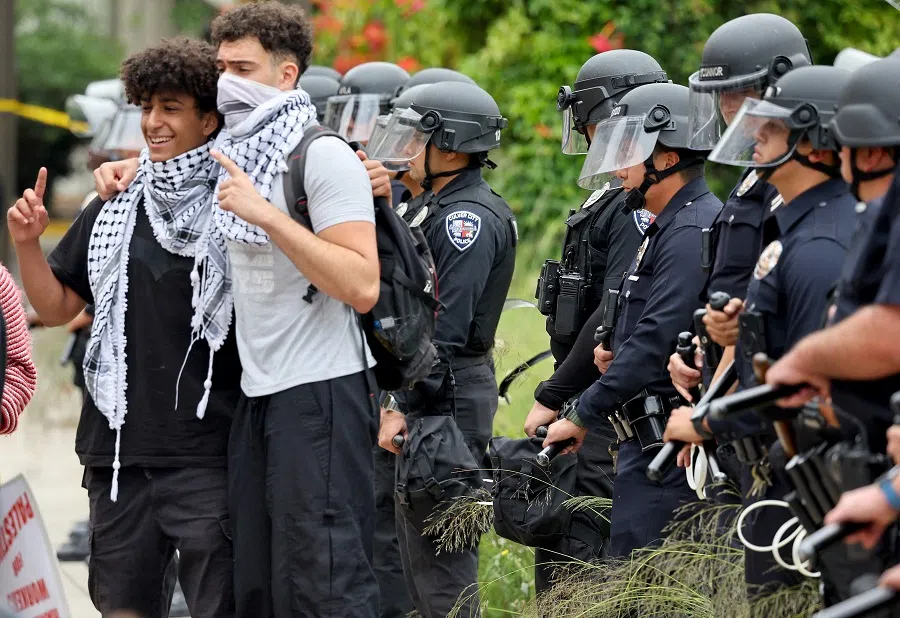
American artist, Joyce Keokham, also said that even though she has graduated and did not participate in the current wave of school protests, she would continue to advocate publicly for Palestinians until Israel ceases its occupation of Palestinian territories, ends the apartheid and gives Palestinians their right to self-determination.
School protests have little impact on US policies
The truth is there is still plenty of firm support for Israel in the US as Jewish groups continue to wield huge influence there, so the school protests are unlikely to sway Washington’s policies towards Israel. While the student protestors have demanded that school authorities cut all economic ties with Israel and terminate academic programmes funded by Israeli companies or donors, most colleges have rebuffed their requests, thus the protests have persisted.
To maintain campus safety and order, some colleges have turned to the police to remove encampments and disperse protestors. According to the latest figures collated by Axios, an American news website, local police forces have arrested around 2,950 people from at least 61 colleges as of 13 May.
The spread of anti-war protests in American colleges indicates that American youths are dissatisfied with and doubtful of Biden’s Gaza policies, and this is very likely to affect his chances of winning a second term during the upcoming US presidential election in November.
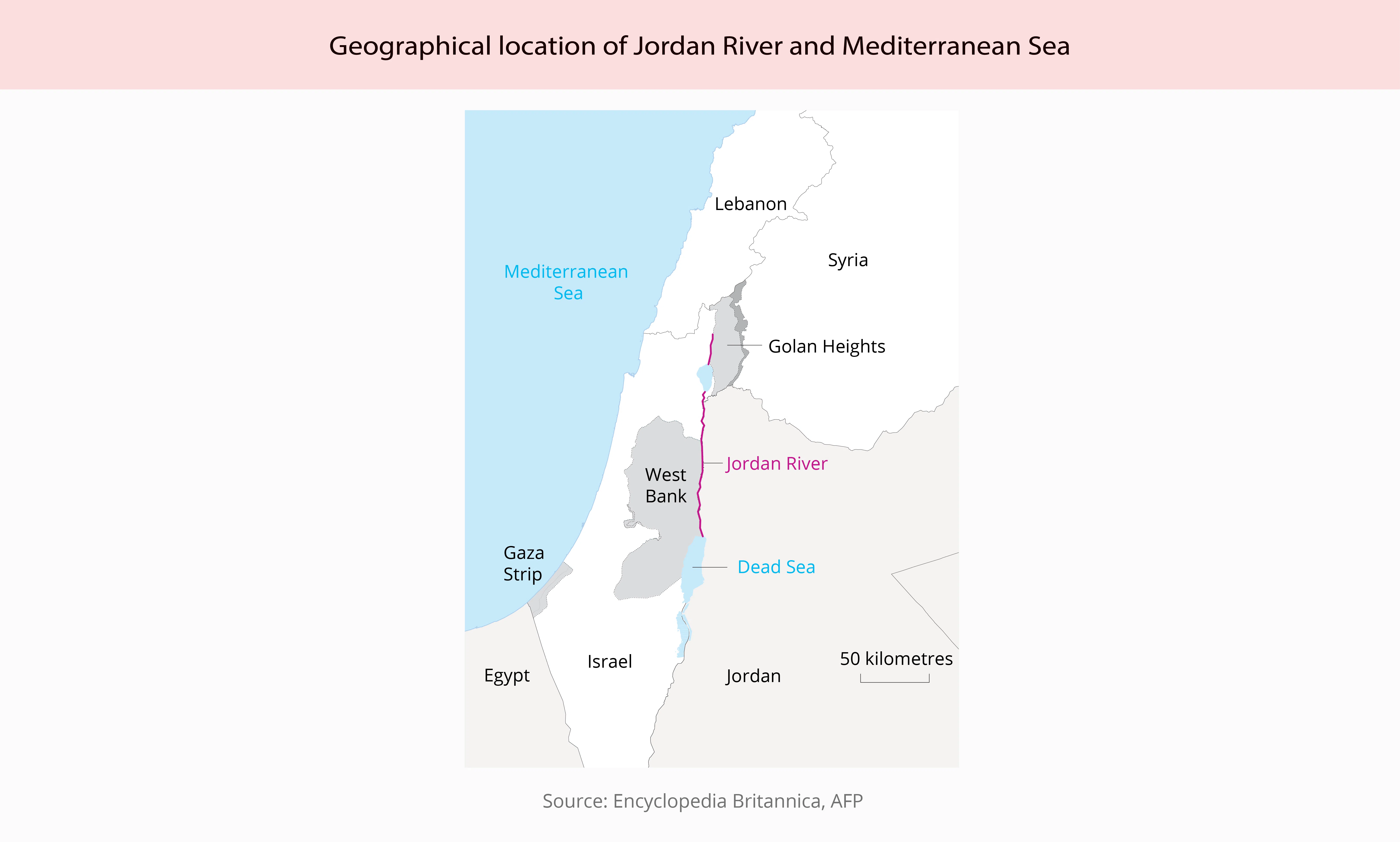
NTU’s Evan Resnick, whose research interests include international relations and US foreign policy, told Lianhe Zaobao that how the school protests turn out will be a barometer for Biden’s election campaign.
He pointed out that if Biden hopes to quell the protests before the presidential election and at the same time not lose the support of younger voters, he would need to adopt a tougher position towards the Israeli government. On the other hand, Biden also cannot alienate the Israelis completely as there is still a pretty strong reservoir of support for Israel in the US, so he would need to walk a tightrope in striking a balance between aiding Israel and ending the anti-war protests.
... the US’s decision-making process is decentralised and fragmented while being mainly driven by vested interests. This makes it very difficult for the Biden administration to unilaterally adjust its policies towards Israel. — Professor Diao Daming, School of International Studies, Renmin University of China,
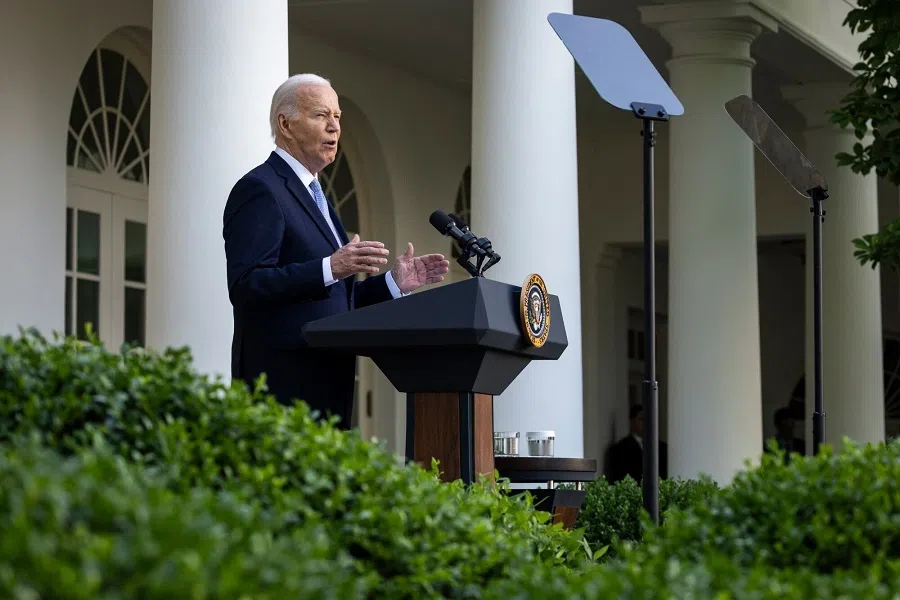
The precarious balancing act is especially evident in the provision of military aid to Israel. On 8 May, as Israeli forces were on the verge of a major offensive in Rafah, a city in southern Gaza, Biden warned Israel for the first time that the US would stop supplying it with offensive weapons as a shipment of 1,800 2000lb (907kg) bombs and 1,700 500lb bombs to Israel was put on hold.
But just a week after that, two US officials said that the State Department has moved a US$1 billion (around S$1.35 billion) package of weapons aid for Israel into the congressional review process. The package includes tank ammunition, mortar rounds, and tactical vehicles, but not bombs.
Professor Diao Daming from the School of International Studies at the Renmin University of China shared his analysis with Lianhe Zaobao that the US’s decision-making process is decentralised and fragmented while being mainly driven by vested interests. This makes it very difficult for the Biden administration to unilaterally adjust its policies towards Israel. It is only able to repeatedly pressurise the Netanyahu administration to request that it suspends military operations and begin peace talks with Hamas to ease the tension in Gaza.
In a Lianhe Zaobao interview, Todd Belt, the director of the Political Management Programme at the George Washington University Graduate School of Political Management, said candidly that there is not much that Biden can do about the campus protests. He added, “I don’t think there’s one thing specifically he can do from a policy standpoint that will satisfy the protesters… [so the protestors would not disperse] unless he sends in the National Guard, but I don’t suspect he will.”
Belt feels that the protests will gradually stop as the summer approaches since there will be little activity to disrupt on college campuses then. As to whether the protests would return when classes resume in late August, his view is that much would depend on the situation in Gaza then.
Professor Liu from Fudan University opined that Biden would be in a precarious position if he is unable to end the wave of college protests before the Democratic National Convention is held in August.

NTU’s Evan Resnick feels that the Israeli government has not done itself any favours in the way that it has managed the war in Gaza because it has turned a lot of opinions, especially among younger Americans against it. He continued, “That’s not good for Biden because to win the White House, the Democratic candidate has to get a lot of the youth vote since youths typically support the Democrats far more than the Republican candidate. So, he doesn’t want to alienate the young people.”
The students who demand for their schools to divest from Israel actually do not know whether their universities invested in assets related to Israel. As such, some students have urged greater transparency in this regard.
Complex investment portfolios make divestment a challenge
The wave of campus protests in the US has since spread to many countries in Europe, Canada and India. The student protestors are primarily asking for the war in Gaza to end and for university endowment funds to divest from Israel. This basically entails selling their investment assets in Israel, and company assets that provide weapons and technology to the Israeli government.
At the moment, only some smaller scale colleges have agreed to divest, including the Evergreen State College in Washington state, the Union Theological Seminary in New York City, and the Trinity College Dublin in Ireland. A few other universities including Northwestern University and Brown University agreed to put the issue up for discussion or to a vote. On the other hand, Columbia University rejected the request outright, while Harvard University agreed to answer endowment fund questions from its students after turning down their calls to divest.
Getting university endowment funds to divest has never been a simple and straightforward matter, especially since it involves Israel in this instance.
Such funds mainly comprise donations that colleges subsequently invest in assets like stocks, bonds, and investment funds to generate returns. Every year, school authorities withdraw a small portion (usually less than 5%) of the investment returns to pay salaries and for scholarships, and to build new school buildings.
Since most schools are not required to disclose such investments, the portfolios of these endowment funds are typically complex and opaque. The students who demand for their schools to divest from Israel actually do not know whether their universities invested in assets related to Israel. As such, some students have urged greater transparency in this regard.
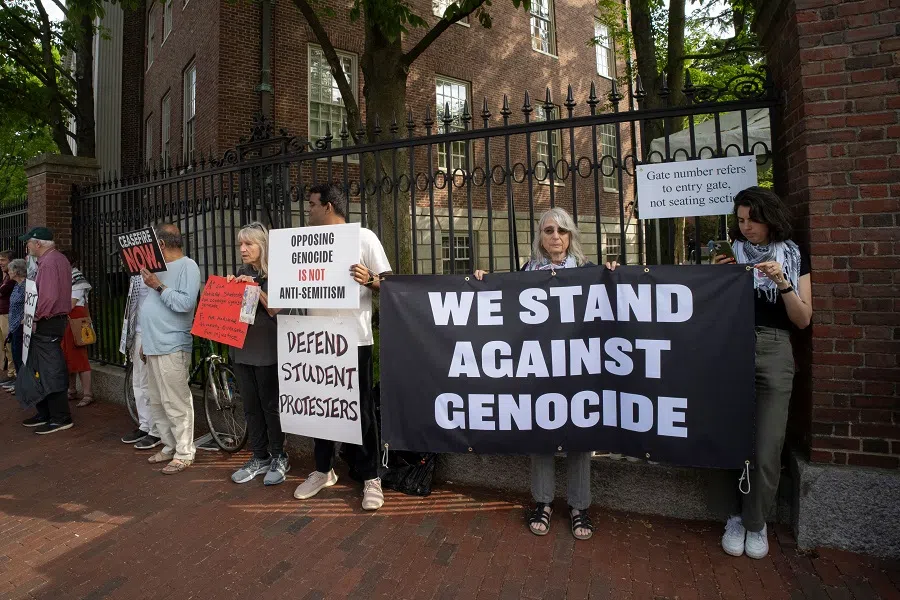
The complexity of their investment portfolios also means that colleges are unable to divest easily. As university endowment funds usually invest in different sectors to achieve a balanced portfolio, not investing in a certain asset class anymore would involve rebalancing the entire portfolio, and such a move could lower investment returns and affect school incomes. In fact, the University of Michigan refused to divest by explaining that such a move would “increase investment risks and lower investment returns”, causing its income to decrease.
Furthermore, there might be legal implications if university endowment funds divest from Israel. In the US, at least 38 states have legislations that forbid public universities from engaging in acts to boycott Israel, labelling such acts antisemitic.
Explaining the reasons for the Ohio State University turning down demands from students to divest, its spokesperson said, “Ohio Revised Code section 9.76 prohibits the university from divesting any interests in Israel and prohibits adopting or adhering to a policy that requires divestment from Israel or with persons or entities associated with it.”
Even if divestment is legal, donors may not allow universities to do so. For example, Brown University’s decision to put the divestment issue before its school board for a vote in exchange for its students to end protests angered some donors. The irate donors indicated that if the college decides to divest from Israel, they would reduce or stop their donations.
On the other end of the spectrum are those who interpret it as a call to exterminate Israel.
Protest chant sparks antisemitism controversy
Pro-Palestine protests in colleges around the world have also ignited a debate on whether such acts are antisemitic. On the one hand, the protestors feel that while they are against Israel and the war in Gaza, they do not discriminate against or hate Jews; but on the other hand, those who are pro-Israel think otherwise.
A reason for the controversy is that the protestors often chant the slogan “From the river to the sea, Palestine will be free”.
The river in the slogan refers to the Jordan River, while the sea is the Mediterranean Sea. Historically, the land between the Jordan River and the Mediterranean Sea is known as Palestine. Today, it includes Israel and the West Bank it occupies, as well as the Gaza Strip controlled by the Hamas extremists.
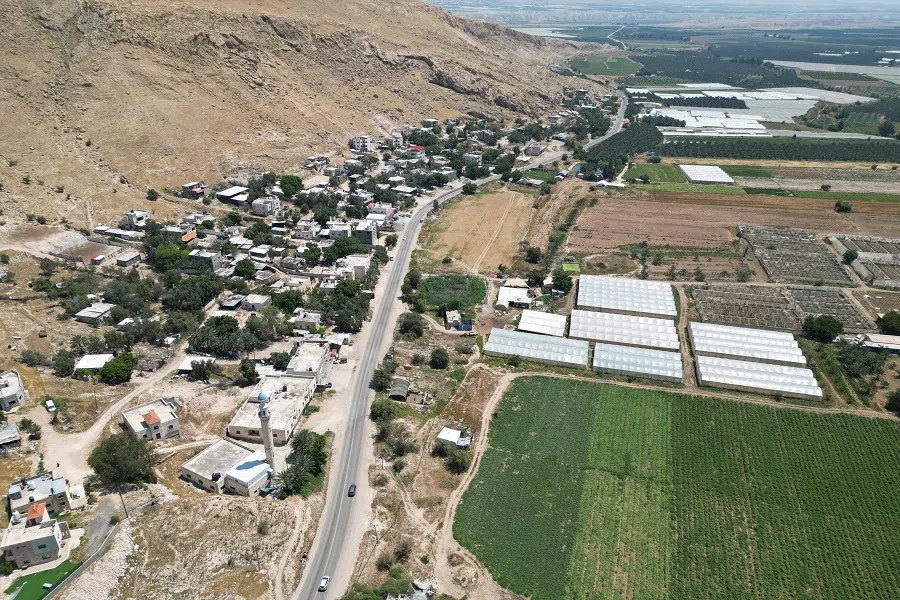
For the majority of those who are pro-Palestine, the slogan is a call for peace and equality for the millions of Palestinians who have been living under Israeli occupation for decades. On the other end of the spectrum are those who interpret it as a call to exterminate Israel.
The earliest usage of the chant can be traced back to 1964 when the Palestine Liberation Organisation (PLO) began using it. At its founding, the PLO sought to establish a unified Palestine which extends from the Jordan River to the Mediterranean Sea. It also rejected outright the 1947 United Nations plan to partition Palestine.
After the Six-Day War in 1967, more Palestine organisations adopted the slogan and used it to call for the return of Palestinian territories from Israeli occupation.
In 2012, the former Hamas leader, Khaled Meshaal, said in his speech at the 25th anniversary of his organisation’s founding, “Palestine is ours from the river to the sea and from the south to the north. There will be no concession on any inch of the land.”
In 2017, Meshaal’s words were written into Hamas’s revised charter.
As extremist groups use the slogan, its critics feel that it advocates the dissolution of Israel, and the exile or extermination of the Jewish people.
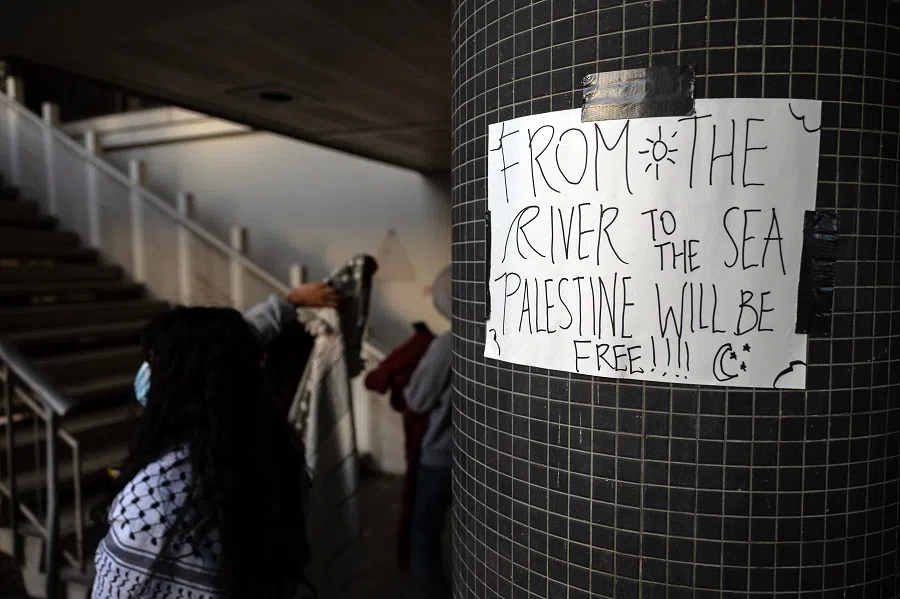
At the end of 2023, after pro-Palestine protests erupted in many countries, including the US, 30 Jewish media outlets around the world published an open letter that included the following: “Have no doubt that Hamas is cheering those ‘from the river to the sea’ chants because a Palestine from the river to the sea leaves not a single inch for Israel”.
However, it should also be pointed out that Likud, the political party of the incumbent prime minister of Israel, also quoted this phrase in its 1977 election platform which called for “only Israel sovereignty” between the Mediterranean Sea and the Jordan River.
This article was first published in Lianhe Zaobao as “美国校园挺巴学潮 动摇拜登挺以决心”.




![[Big read] When the Arctic opens, what happens to Singapore?](https://cassette.sphdigital.com.sg/image/thinkchina/da65edebca34645c711c55e83e9877109b3c53847ebb1305573974651df1d13a)

![[Video] George Yeo: America’s deep pain — and why China won’t colonise](https://cassette.sphdigital.com.sg/image/thinkchina/15083e45d96c12390bdea6af2daf19fd9fcd875aa44a0f92796f34e3dad561cc)